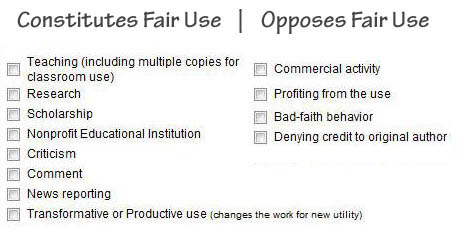
6. Ethics
d. Copyright
"copyright (kŏp'ē-rīt') The legal right granted to an author, composer, playwright, publisher, or distributor to exclusive publication, production, sale, or distribution of a literary, musical, dramatic, or artistic work...
Copyright regulates the use of a particular expression of an idea or information. At its most general, it is literally "the rights to copy" an original creation. In most cases, these rights are of limited duration."
The American Heritage® Dictionary of the English Language, Fourth Edition. Houghton Mifflin Company, 2004. Answers.com 28 Jan. 2008. http://www.answers.com/topic/copyright
Fair Use Doctrine
In copyright law, quotation or reproduction of a small portion of copyrighted material (with proper acknowledgment), does not require the permission of the copyright holder. The amount varies in proportion to the length of the original, the governing theory being that the use should not decrease the market for the original.
The rules are ambiguous and laws are always being tested. With that in mind, here is a very basic "rule of thumb" reference:

For more on Fair Use:
-
United States Copyright Office: http://www.copyright.gov/fls/fl102.html
Self-Test |
 ARCC ILT
© 2013
ARCC ILT
© 2013
Anoka Ramsey Community College Library
Information Literacy Tutorial
Send comments or questions regarding this site to:
Barbara Sandarin, Librarian/Faculty